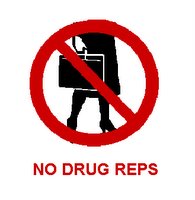
Is it an idea whose time is coming: doctors saying "NO" to gifts from drug reps? The answer could be "YES"!
The practice of drug reps bearing any type of gift should be stopped, some physicians say in a recent article in JAMA.
Big Pharma spend vast sums of money to court doctors - way more than they do on research - it seems as though the companies are the most important part of that system, and that the doctors come in second.
So where's the benefit for patients?
That is exactly the concern raised in the Journal report.
Most of the gifts doctors ordinarily receive are modest in value: a box of pens or writing pads promoting a drug, for instance. However, sometimes doctors are given vacations, golfing trips, or hefty consultancy contracts.
Most patients never find out. If they did, they'd probably go into shock over the goodies doctors accept. Big Pharma estimates that it spends about $5.7 billion a year on marketing directly to physicians, which works out to about $6,000 to $7,000 per doctor. That is probably an understimate.
Dr. Stephen Cha is an internist and a Robert Wood Johnson clinical scholar at Yale University School of Medicine. He wrote an interseting piece in the Washington Post last year:
"As a medical student, a colleague of mine once walked into the offices of a practice where she was working and unexpectedly found herself at a party. Food, trinkets, pens and coffee mugs were being handed out to the whole office staff, about 20 people including med students and doctors -- all courtesy of Merck & Co. And to the physician who was the number one prescriber of Vioxx in the entire region that year, a marketing rep of the company awarded a pair of Philadelphia Eagles season tickets."
It's worrisome that imposition of a ban on such gifts may not lead to much real change. Enforcement could be a problem. It should probably be a matter for professional ethics rather than legislation, in Insiders' opinion.
The best hope might be for medical schools, teaching hospitals, and medical associations such as the American Medical Association to condemn such practices as unethical.
Of course, doctors' groups could follow the example set by Kaiser Permanente and a few other managed-care organizations, which have already adopted the recommendations. It seems to work ok in California.
Insiders' view: It is rapidly becoming a professional issue that wont go away. Visit No Free Lunch to sign the pledge! You know it makes sense.
Start to make accepting gifts a professional matter. The public should ask difficult questions of doctors that still accept gifts and see reps.
Marcia Angell, MD, former editor in chief of The New England Journal of Medicine, and author of the book The Truth About the Drug Companies (see review) comes to mind. She urges readers to ask their doctors this question: "Do you make time for visits from drug company representatives?"
If the answer is yes, Angell says you should consider changing doctors.
Sources: Toledo Blade , Boston Herald
1 comment:
I strongly agree that physicians should avoid all gifts and favors from pharmaceutical (and device, health care IT, and other such) companies that could give the slightest appearance of conflict of interest.
I also agree with most of the commandments presented in the JAMA article.
But I believe that this article greatly over-simplified some issues. Physicians face conflicts not only in their relationships with pharmaceutical and device manufacturers, but in their relationships with a variety of other entities, particularly, at least here in the US, with managed care organizations and insurance companies. The JAMA article ignores such conflicts.
Furthermore, there are important conflicts that affect other individuals involved in health care, particularly those who lead health care organizations. The JAMA article also ignores such conflicts.
Finally, given that some of the leaders of academic medical centers have mismanaged their organizations, and a few here in the US have been convicted of crimes, giving these leaders the power to enforce conflict of interest rules on physicians, as advocated by the JAMA article, does not make a lot of sense.
See our related post (http://hcrenewal.blogspot.com/2006/01/dodging-stones-thrown-from-glass.html/) on Health Care Renewal (http://hcrenewal.blogspot.com/).
Post a Comment